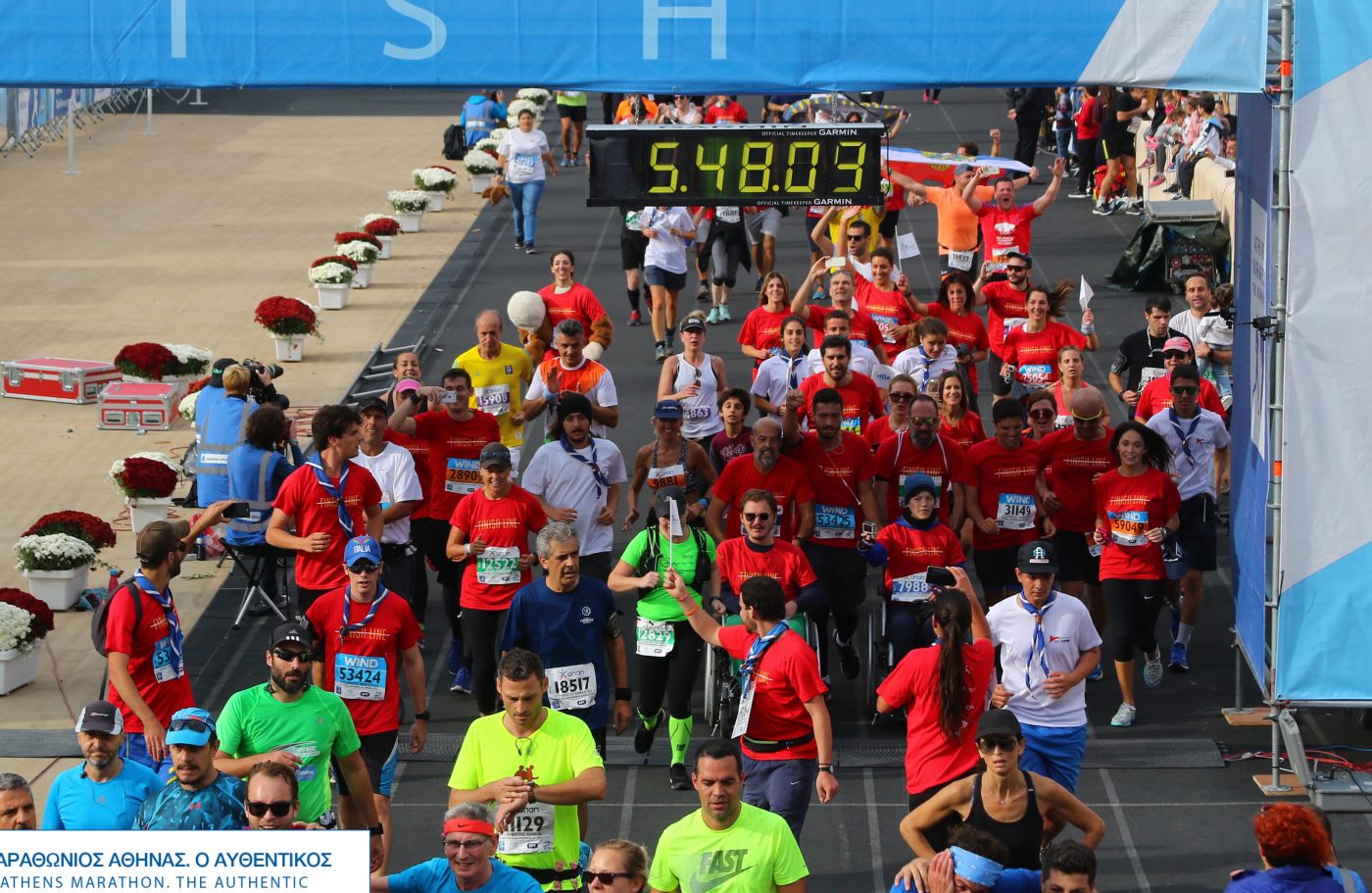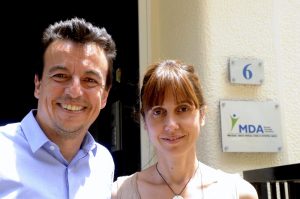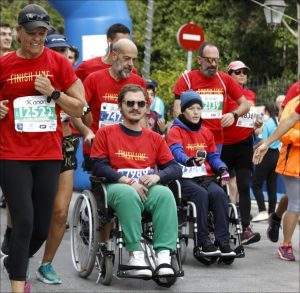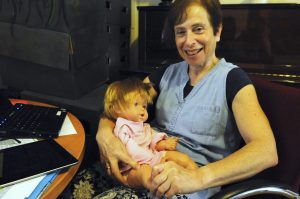MDA Hellas Gives Greek SMA, Duchenne Patients Reason to Hope

Runners help push disabled athletes in wheelchairs across the finish line at the 35th Athens Marathon on Nov. 12, 2017. (Photo courtesy of MDA Hellas)
Either by coincidence or by design, MDA Hellas, the Muscular Dystrophy Association of Greece, is located on Elpidos Street in downtown Athens. Elpidos is Greek for “hope” — and that’s exactly what MDA Hellas offers the many neuromuscular disease patients under its care.
Antigone Karras is executive manager of the nonprofit organization, which was established in 2000 with help from Elizabeth Baylies-Burns, wife of the then-U.S. ambassador to Greece, Nicholas Burns.
Housed in a three-story building fronting historic Victoria Square, MDA Hellas runs three interdisciplinary units — one each in Athens, Thessaloniki and Patras. The agency operates on an annual budget of €500,000 (about $585,000), including donations from individuals, foundations and local companies.
Karras said about 120 of the 1,100 children and adults treated by MDA Hellas have spinal muscular atrophy (SMA). Another 500 are Duchenne muscular dystrophy patients; most of the rest have myopathy, myasthenia gravis, ALS or Friedreich’s ataxia.
Besides budget constraints triggered by a struggling Greek economy — burdened with considerable external debt and 20 percent unemployment — MDA Hellas also must deal with ignorance.
“Many Greeks don’t know anything about muscular dystrophy,” said Karras, who’s been with the organization for its entire 18 years. “We still have people calling us, asking if it has something to do with multiple sclerosis.”
Pushing wheelchairs and politicians
To publicize its efforts, MDA Hellas conducts five or six annual fundraising events such as bazaars, lunches, galas and concerts. It also participates in World Duchenne Awareness Day, held on Sept. 7 in a nod to the 79 exons comprising the dystrophin gene defective in people with Duchenne. This year, MDA Hellas plans to mark the occasion by releasing 500 red balloons, symbolizing the roughly 500 Greeks with the disease.
In November, MDA Hellas sponsors a 42.2-kilometer marathon in which nearly 500 people participate — a fitting event for a country that gave the world the marathon in the first place.
“For the past two years, we have had a group called the Finish Liners, escorting two children on wheelchairs for the whole route,” Karras told SMA News Today.
Dimitris Athanasiou is a Duchenne patient representative with MDA Hellas whose son, Hermes, has the disease. He said the Greek government completely covers the cost of pediatric therapies — even expensive treatments like Spinraza (nusinersen) for SMA, and Translarna (ataluren), a Duchenne treatment with conditional approval in Europe for patients as young as 2.
“Politicians care only as long as we push them. But that’s the challenge. Most people don’t know anything about rare diseases,” said Athanasiou, a former financial consultant who gave up his job to become a full-time Duchenne advocate. “That’s why we’ve done a lot of campaigning in the last few years.”
‘A marathon, a race against time’
Marion Main, who was visiting Greece at the time of this interview, is a British neuromuscular physiotherapist with 30 years of experience. She’s associated with London’s Great Ormond Street Hospital, which operates the biggest unit of its kind in the U.K.
“Physiotherapy is a tiny part of care,” she said. “What I’ve seen here in Greece is a willingness to learn, and overall compliance with standards of care, but in some cases a lack of expertise and knowledge.”
Main, who treats seven to eight children a day, said that each year her unit at GOSH sees 250 patients with Duchenne, 190 with Charcot-Marie-Tooth disease and 160 with SMA — including 29 type 1 SMA children receiving Spinraza.
Besides Greece, Main has volunteered in India, Israel, Poland, Russia and Serbia.
“My goal when I come to a country like this is to teach physiotherapists to think neuromuscular, and to teach them that anything that’s done passively to a child will never have any long-term effect,” she said. “Whatever I do to a muscle is passive and will not produce a reaction without that child’s help and cooperation. Children should not be lying down thinking about their phone or their next meal or the TV. They need to be actively involved.”
Athanasiou noted that with therapies currently available, the life expectancy of boys and young men with Duchenne is climbing gradually every year; one Greek patient recently celebrated his 40th birthday.
“It really is a marathon, a race against time,” Athanasiou said. “You have to keep these kids in the best possible condition for as long as you can — because if, for example, they are very well-managed with hydrotherapy, physiotherapy and corticosteroids, chances are they will not need a spinal operation for scoliosis.
“That means slower decline of heart and pulmonary function, and less injury to the children.”









